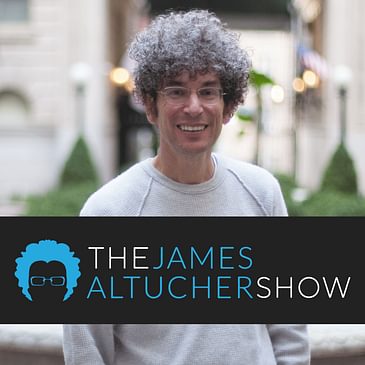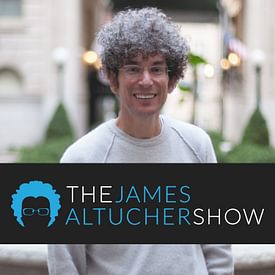A Note from James:
I am thrilled to celebrate the 10th anniversary of my podcast. Occasionally, I'll feature some timeless episodes as if they're brand new, sharing those that have greatly impacted me. One such figure is Nassim Taleb, whom I consider one of the smartest people on the planet.
I've learned so much from Nassim, and I'm not sure he realizes or cares just how influential he's been on me. I was extremely grateful when he agreed to appear on my podcast. There's an interesting backstory to his appearance: he joined my show a few years ago, and we are airing that episode now, though he might not be aware of the whole story.
Back in 2002, I was desperate—I was broke, struggling, losing my house, and my family was falling apart. I wrote to 20 influential individuals, including well-known investors and writers like Warren Buffett and Carl Icahn, expressing my desire to meet them. Only three responded.
Jim Cramer was one of them. I had sent him ten ideas for articles he could write for TheStreet.com. To my surprise, he responded positively and encouraged me to write the articles myself, which kickstarted my career as a writer. From financial columns, I expanded into other topics.
Victor Niederhoffer also replied because I sent him software programs tailored to his trading style, offering them for his and his traders' use and my assistance if needed, with no pressure to respond.
Nassim Taleb was another who responded. I had reached out to him because I admired his book "Fooled by Randomness" and wished to meet him. Although he was willing to meet, I never followed up. However, many years later, he came on my podcast, bringing everything full circle, for which I am immensely grateful.
Now, I am honored to reintroduce one of the smartest men in the universe, Nassim Taleb.
Episode Description:
In this episode, we explore Nassim Taleb's influential ideas, specifically his thoughts on antifragility, the unpredictability of life, and the beneficial role of trial and error in diverse areas such as technology, health, and business. As we mark ten years of learning, the host shares transformative conversations with Taleb, revealing how chaos and uncertainty can fortify systems, people, and industries. We examine Taleb's key principles: reducing interference, valuing variability, and the necessity of personal investment in outcomes. We also look at concrete examples. Further, we discuss how embracing errors and innovation can lead to breakthroughs in sectors like drug development and business ventures, and address the negative impacts of excessive rescue measures and regulatory constraints. Through a blend of personal anecdotes and theoretical exploration, this episode encapsulates the essence of antifragility as a pathway to resilience and fulfillment.
Episode Summary:
00:00 Celebrating a Decade of Podcasting: A Special Revisit
00:35 The Power of Cold Emails: Life-Changing Connections
02:04 Nassim Taleb: A Mind That Shaped My Worldview
02:51 Exploring the Impact of Technology Through the Lens of Anti-Fragility
04:18 The Evolution of Communication: From TV to Social Media
04:47 The Paradox of Technological Progress: A Historical Perspective
05:43 Disruptive Innovations and the Cycle of Technology
08:41 Personal Anecdotes and the Philosophy of Email Communication
09:24 The Intricacies of Responding to Emails and Setting Boundaries
10:56 Journalism, Social Media, and the Quest for Authenticity
15:27 Understanding Fragility vs. Anti-Fragility: A Deep Dive
26:07 The Role of Variability and Stressors in Evolution and Health
31:49 Applying Anti-Fragility to Diet, Exercise, and Lifestyle
49:43 The Importance of Political Variability and the Unpredictability of Life
51:40 Exploring the Anti-Fragile Lifestyle
52:00 The Power of Walking and Creative Thinking
54:22 Embracing Natural Elements for Health
55:06 Rethinking Medicine and Personal Health Strategies
57:30 Navigating Social Relationships and Disruption
01:00:31 The Essence of Anti-Fragility in Life and Work
01:09:34 Understanding the Financial System and Its Fragilities
01:12:33 The Role of Entrepreneurship and Risk in Society
01:29:51 Reflecting on Writing, Publishing, and Intellectual Pursuits
01:41:37 Closing Thoughts and Future Directions
------------
- What do YOU think of the show? Head to JamesAltucherShow.com/listeners and fill out a short survey that will help us better tailor the podcast to our audience!
- Are you interested in getting direct answers from James about your question on a podcast? Go to JamesAltucherShow.com/AskAltucher and send in your questions to be answered on the air!
------------
- Visit Notepd.com to read our idea lists & sign up to create your own!
- My new book, Skip the Line, is out! Make sure you get a copy wherever books are sold!
- Join the You Should Run for President 2.0 Facebook Group, where we discuss why you should run for President.
- I write about all my podcasts! Check out the full post and learn what I learned at jamesaltuchershow.com
------------
Thank you so much for listening! If you like this episode, please rate, review, and subscribe to “The James Altucher Show” wherever you get your podcasts:
Follow me on social media:






